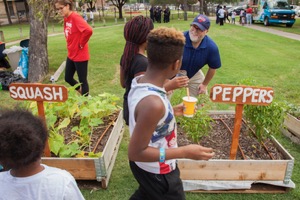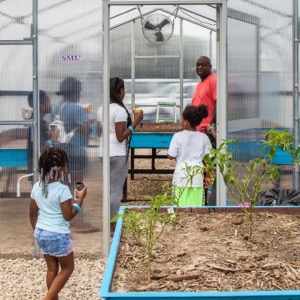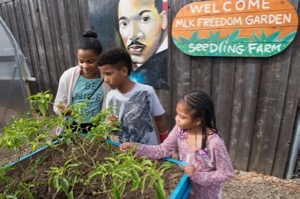
Dr. Owen Lynch of SMU spearheaded the Seedling Farm to combat the shortage of healthy food outlets in South Dallas. Photos courtesy of the Seedling Farm.
Feb. 20, 2018
Hoping to bring better health and job opportunities to South Dallas, a public-private partnership is sowing seeds of change, literally by sowing seeds.
The operation known simply as the Seedling Farm is sowing thousands of vegetable seeds in small containers in a 500-square-foot greenhouse at the Martin Luther King, Jr. Community Center Freedom Garden near Fair Park.
Once these seeds germinate and grow into hardy, established plants, they’ll be distributed to gardeners in the South Dallas area where they can be planted out into both private plots and community gardens.
 The Seedling Farm was spearheaded by Dr. Owen Lynch, associate professor of organizational communication at SMU Meadows School of the Arts and senior research fellow at SMU’s Hunt Institute for Humanity and Engineering. Lynch is also the director of the nonprofit urban farm consulting agency, Get Healthy Dallas.
The Seedling Farm was spearheaded by Dr. Owen Lynch, associate professor of organizational communication at SMU Meadows School of the Arts and senior research fellow at SMU’s Hunt Institute for Humanity and Engineering. Lynch is also the director of the nonprofit urban farm consulting agency, Get Healthy Dallas.
Owen Lynch talks to students at the Seedling Farm.
The decision to undertake such an operation, Lynch says, came from with the South Dallas community itself.
“What we realized is that there are multiple gardeners in the community and there are multiple, small urban farms, and one of the things that would be most helpful to them is having a regional expert that could grow their seedlings for them so that they could have a source of affordable seedlings for their own gardens," said Lynch. "So this was a way we could start and feed a system, so to speak, so it could become more viable.”
The farm, under the direction of horticulturalist Tyrone Day, aims to put 20,000 seedlings into the hands of local growers every year. Sold at a fraction of their retail value to encourage participation, the seedlings offer a head start on garden crops, thus bypassing the fragile stage of a plant’s growth cycle when seeds emerge from the soil and are vulnerable to anything but ideal conditions.
Although the farm has only been open since November, it has already distributed thousands of winter crop seedlings such as kale, broccoli and cauliflower to local residents and is in the process of raising up seedlings of tomatoes, peppers and other warm season crops for the spring.
The farm, under the direction of horticulturalist Tyrone Day, aims to put 20,000 seedlings into the hands of local growers every year.
To improve growers’ success rate, the farm offers only crop varieties that are proven to perform well in the area, and Day and members of the Texas Agrilife Extension make themselves regularly available to answer questions and offer farming advice.
 Nourishment for a Food Desert
Nourishment for a Food Desert
The effort is intended to make fresh, nutritious produce available to more people who live in a region that the USDA has identified as a food desert – a highly populated urban area where low income and a scarcity of grocery stores keep residents from easily accessing fresh fruits and vegetables.
Horticulturist Tyrone Day, right, operates the Seedling Farm.
“South Dallas has very few retail outlets for fresh, healthy food, and it hasn’t had this for the last 30 to 40 years,” Lynch says. “What that means is you have an entire community that has to travel outside the region, usually using public transport, which can be a three-hour round trip, just to buy groceries, particularly to buy healthy groceries.”
With the food desert comes a job desert, Lynch says, which is an urban area with concentrated poverty where residents must travel to other parts of the region to find jobs. Because both work and commerce take place outside of the community, resources within the community are continually eroded, thus perpetuating the cycle of poverty.
“South Dallas has very few retail outlets for fresh, healthy food, and it hasn’t had this for the last 30 to 40 years,” Lynch says. “What that means is you have an entire community that has to travel outside the region, usually using public transport, which can be a three-hour round trip, just to buy groceries, particularly to buy healthy groceries.”
“The Hunt Institute has done research that shows the overlap of food deserts with high unemployment, reduced access to healthcare, high use of diabetes medications –so what you find is a food desert, a jobs desert, a health desert, an infrastructure desert, a transportation island – there are lots of ways of looking at it,” Lynch says.
Urban Revival
Increasing access to healthy food is only part of the operation’s mission; bringing economic revival to South Dallas is an additional goal. Lynch says the effort requires a multi-partner coalition to come together from within the community if it will be successful. For this reason, the work is being conducted under the name, Restorative Farms.
Increasing access to healthy food is only part of the operation’s mission; bringing economic revival to South Dallas is an additional goal.
 “Even though this is a Get Healthy Dallas project launched on SMU research, we use the term Restorative Farms because we want it to be bigger than us,” Lynch says. “There are groups of people coming together to form the beginnings of an urban farming system and trying to help each other, so we use the term Restorative Farms, and we put this project underneath the umbrella name so that we can have lots of different projects with lots of different entrepreneurs,” Lynch says.
“Even though this is a Get Healthy Dallas project launched on SMU research, we use the term Restorative Farms because we want it to be bigger than us,” Lynch says. “There are groups of people coming together to form the beginnings of an urban farming system and trying to help each other, so we use the term Restorative Farms, and we put this project underneath the umbrella name so that we can have lots of different projects with lots of different entrepreneurs,” Lynch says.
KIds check out the demonstration garden at The Seedling Farm at the MLK Community Center.
Lynch says he hopes to see South Dallas grow into a food basket for the rest of the city as community gardeners train up into urban farmers and create a steady, year-round supply of fresh produce and break the region from its dependence on food coming from outside of Texas – from California, Florida and even other countries.
Urban farmers develop skills that are projected to be in high demand as the trend of urban food production grows throughout the U.S. Therefore, Lynch sees the seedling farm as a means of putting talent that’s highly sought after in the hands more people.
“With the growth of urban farming in this country, it’s a highly competitive job market. The average farmer is 65 in this country, and most of the farming is done rurally, but with the growth of urban farming as a business, it’s a very highly skilled, needed job and most of the ones with those skills have moved into the regions where the agricultural system is already established” Lynch says. “It’s an area of growing opportunity.”
Gardening Resource
Lynch says locating the farm on the grounds of the the Martin Luther King, Jr. Community Center was an important logistical step for the operation.
“We put it in the community center on purpose, which is a center run by the city of Dallas. It’s got high connectivity to the community; it’s extremely accessible; it’s got child daycare on premises; it’s got a library – a health clinic. It also has a high school next door.
“It was put there so it could become a center for people to learn about urban agriculture and growing, but also to also something else – a supply a viable seedlings that are appropriate for this region and appropriate for the season for which they are created.”
Anyone from anywhere may purchase the seedlings, and qualifying members of the South Dallas community may get up to 100 seedlings for free. Lynch says that unlike retail outlet that sell seedlings that may not be appropriate for the region, the Seedling Farm takes steps to ensure that what people take home will be precisely what their gardens can support.
“What happens is people come and they select what they want, with the consultation of Tyrone Day or the Texas AgriLife Master Gardeners; they go into what their garden is like, where it’s located, what the soil’s like and what they’re going to be growing. They select what plants they like and then in the next three weeks we grow their seedlings for them, and then they can collect them or we deliver them,” Lynch says. “We’ve done as many as 3,000 plants for Bon Ton Farms, or as many as three plants for a person who’s walked in off the street and said they’re interested in gardening on their porch”
"They select what plants they like and then in the next three weeks we grow their seedlings for them.”
Community Collaboration
The operation owes its existence to a partnership of diverse public and private entities, including the SMU Hunt Institute for Humanity and Engineering and the Hart Center for Engineering Leadership at the SMU Lyle School of Engineering, as well as the MLK, Jr. Community Center and Texas A&M AgriLife.
Also lending their support are the Austin Street Center, Café Momentum, Connecting City to Farm and Miles of Freedom.
The community gardens and urban farm partners involved thus far have are Behind Every Door – Village Homes, Bonton Farms, Jubilee Park Community Center, Lincoln High School, Mill City Urban Farm, St. Philip’s School Garden and Sunny South & Nella Roots.
A grant from Wells Fargo and support from Big Tex Urban Farms and the State Fair of Texas funded the project. Get Healthy Dallas handled the logistics.
“The city of Dallas, and Pam Jones were the ones who actually allowed us to be there and gave us the space and paid for the utilities, so they were the ones who took a real risk by actually allowing people to come onto the community center’s property to put the farm there,” Lynch adds.
Lynch says the Seedling Farm will produce about 60 percent of its budget needs; for now the remainder will come from continuing corporate sponsorship and private donations.
“The Seedling Farm would be run very differently if we were trying to make a profit; we wouldn’t be open for community hours every Wednesday and Friday, for example. We wouldn’t hold community events and we wouldn’t provide seedlings for free or at cost,” Lynch says. “To make the farm self-sustaining right now would mean that we’d reduce its community benefit. Our goal is by year three to have some of the other projects that the farm spawns to make up for the loss.”
With a seed swapping event at the MLK, Jr. Community Center on the schedule and the request by a horticulturalist to add her own seed collection to the operation, Lynch sees signs that the Seedling Farm is already fulfilling its purpose.
“That this is a catalyst for other people to get ideas and do things – that is a sign of success to me,” Lynch says. “Another sign of success to me is that we start really producing 16,000 to 20,000 seedlings per year, and that those go to homes or those go to farms where they grow and produce for the local community – and that impact can’t be measured.”
For more information on the Seedling Farm, email Owen Lynch at olynch@smu.edu.
Stay up to date on everything green in North Texas, including the latest news and events! Sign up for the weekly Green Source DFW Newsletter! Follow us on Facebook and Twitter.









